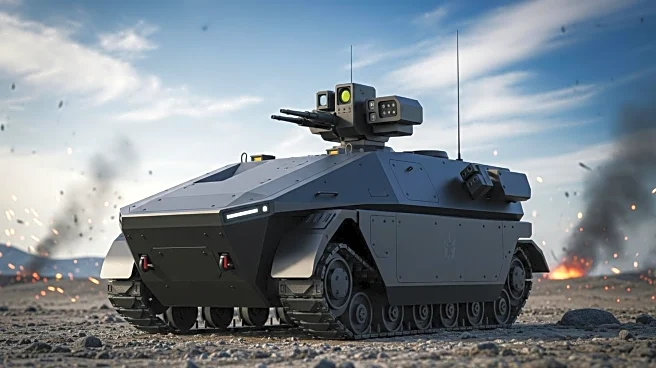What is the story about?
What's Happening?
Unmanned ground vehicles (UGVs) have become a significant force in modern warfare, particularly in the context of Russia's war against Ukraine. UGVs are classified into four segments: combat, explosive ordinance disposal, intelligence, surveillance, and reconnaissance, and logistics. The combat and logistics segments are experiencing rapid growth, driven by the need to mitigate personnel challenges. Ukraine plans to deliver 15,000 UGVs in 2025, supported by a robust domestic industry and international allies. The use of UGVs is expected to double in the next decade, with advancements in AI, batteries, and sensor technologies enhancing their capabilities.
Why It's Important?
The growing role of UGVs in warfare represents a shift in military strategy and technology. These vehicles offer significant advantages in terms of reducing personnel risks and enhancing operational efficiency. The U.S. and other major powers are investing heavily in UGV technology, recognizing its potential to transform military operations. The advancements in UGVs could lead to changes in defense policies and military tactics, influencing global security dynamics. The increased use of unmanned technologies highlights the importance of innovation in maintaining military competitiveness.
What's Next?
The development and deployment of UGVs are likely to continue expanding, with military leaders focusing on integrating these technologies into their forces. The advancements in AI and sensor technologies will drive further innovation, potentially leading to new applications and capabilities. The international community may see increased collaboration and competition in the UGV market, as countries seek to enhance their military capabilities. The ongoing conflict in Ukraine serves as a testing ground for UGVs, providing valuable insights into their effectiveness and potential.
Beyond the Headlines
The rise of UGVs raises ethical and legal considerations regarding the use of autonomous technologies in warfare. The potential for unmanned vehicle swarms to attack personnel and infrastructure poses new challenges for military strategy and defense planning. The integration of UGVs into military operations could lead to changes in the nature of warfare, with implications for international law and security policies. The focus on unmanned technologies reflects broader trends in military innovation and the pursuit of technological superiority.















